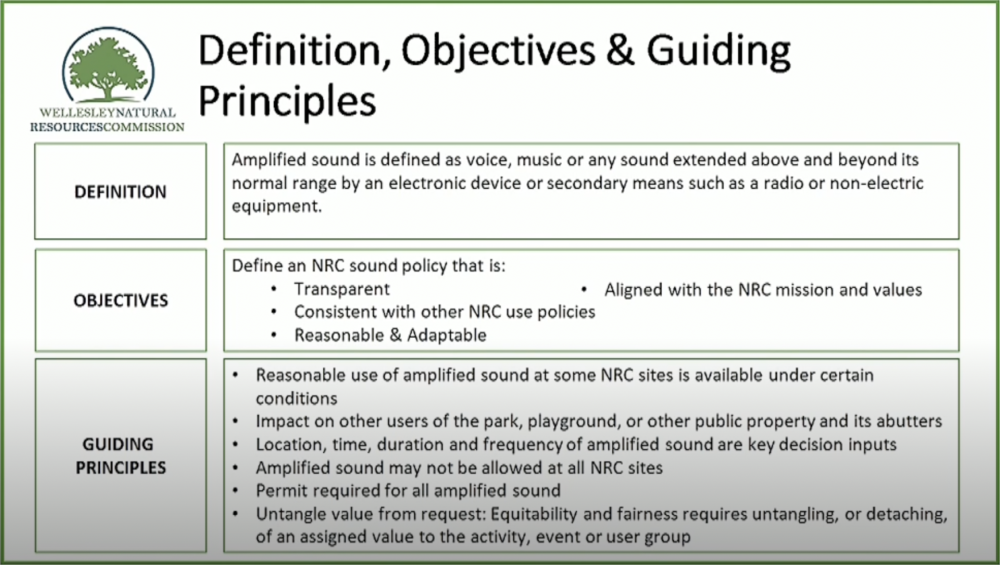Wellesley taking steps toward outdoor amplified sound policy
Plenty of noise has been made in Wellesley about the need for a consistent outdoor amplified sound policy, and the Natural Resources Commission is now taking steps to put one in place at least for its properties, such as the Hunnewell Field complex and Perrin Park. The NRC during a summer retreat listed completing a sound policy as one of its 2024 objectives.
Commissioner Lisa Collins has been conducting research on the issue for months, and at the NRC’s Nov. 16 meeting (see Wellesley Media recording) she shared ideas that have emerged from that work. She stressed that the presentation shared at the meeting (and a draft policy being circulated among NRC members) was just to get a conversation started, not any sort of decision. Though there does seem to be agreement in town that sound rules should be equitable, say for baseball and softball, and could vary based on location, such as those near homes or not.
The town’s recently completed Athletic Fields & Outdoor Courts Utilization Study showed that while a large percentage of respondents were “very receptive” to amplified sound, the next biggest group of respondents were “not receptive.” Volume, time of day, type of sound, and duration were all cited as considerations. As we heard during the debate about bringing lights to the high school track and field, while some neighbors were opposed to lights, others were more concerned about the companion increase in noise.
The NRC is looking to develop its own amplified sound policy as part of its handbook, though a policy could also serve as one that Schools or other organizations in town could adopt and adapt for their purposes.

Collins reviewed questions raised in past permits and looked at what other built-out communities in the area have done on the sound policy front (not a ton, with self-monitoring the norm). The NRC has approved amplified sound on a permit-by-permit basis for most of its properties (though the Hunnewell Track & Field complex does have a specific set of rules), and has had to deal with permittees who have misunderstood or straight out ignored sound rules. The thought by groups to even have sound at their events has become more prevalent in large part because it’s now so easy to crank up the tunes anywhere via phones and wireless speakers.
Sound questions can arise before the NRC and its Playing Fields Task Force advisory group for everything from annual town events such as Wellesley’s Wonderful Weekend to ongoing camp requests.
Please support your local news source, The Swellesley Report, by contributing or by becoming an advertising partner.
An NRC discussion this past spring regarding a request for amplified sound for a sports program at Kelly Field raised issues of “a slippery slope” in allowing amplified sound, the concerns of neighbors, and the importance that some see in the relationship between playing music and enjoyment of sports. The NRC in May approved a request for amplified sound via portable gear at a few Youth Softball games, a decision made in part out of fairness given a tradition of amplified sound use at Reidy Field, where a built-in sound system is used for Little League baseball games.
Collins raised the idea of including in the policy caps based on various criteria such as per field, number of events, season, or total duration of sound. She put forward a recommendation that all requests for amplified sound must be permitted, and that some fields, such as Perrin Park, only be available for one-off requests rather than ongoing ones.
During discussion by the Committee, member Laura Robert suggested some thinking go into what constitutes “unwanted sound,” be it pounding music, sound near a playground, or other such considerations (NRC Director Brandon Schmitt chimed in with “vuvuzelas,” those loud horns sometimes heard at soccer matches). Music selection could be another factor, and Joe Roberts of Terriers Sports has mentioned during deliberations on his past sound requests the use of apps that can regulate lyrics based on the age of participants.
The NRC could inventory its sites and come up with a list of what’s acceptable or not for sound at each location, Collins said.
As a next step, NRC members plan to comment on the draft policy and presentation shared by Collins, and discuss it at a meeting in December.